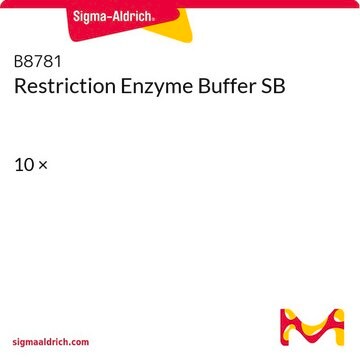11417991001
Roche
SuRE/Cut™ Buffer H
solution, pkg of 5 × 1 mL
Sinónimos:
SuRE/Cut Buffer for Restriction Enzymes, restriction enzyme buffer
About This Item
Productos recomendados
Categorías relacionadas
General description
Application
Other Notes
Legal Information
Storage Class
12 - Non Combustible Liquids
wgk_germany
WGK 1
flash_point_f
No data available
flash_point_c
No data available
Elija entre una de las versiones más recientes:
¿Ya tiene este producto?
Encuentre la documentación para los productos que ha comprado recientemente en la Biblioteca de documentos.
Artículos
The term “Restriction enzyme” originated from the studies of Enterobacteria phage λ (lambda phage) in the laboratories of Werner Arber and Matthew Meselson.
Contenido relacionado
Restriction endonucleases in prokaryotes function primarily to protect against foreign genetic material, notably bacteriophage DNA.
Restriction endonucleases in prokaryotes function primarily to protect against foreign genetic material, notably bacteriophage DNA.
Restriction endonucleases in prokaryotes function primarily to protect against foreign genetic material, notably bacteriophage DNA.
Restriction endonucleases in prokaryotes function primarily to protect against foreign genetic material, notably bacteriophage DNA.
Nuestro equipo de científicos tiene experiencia en todas las áreas de investigación: Ciencias de la vida, Ciencia de los materiales, Síntesis química, Cromatografía, Analítica y muchas otras.
Póngase en contacto con el Servicio técnico






